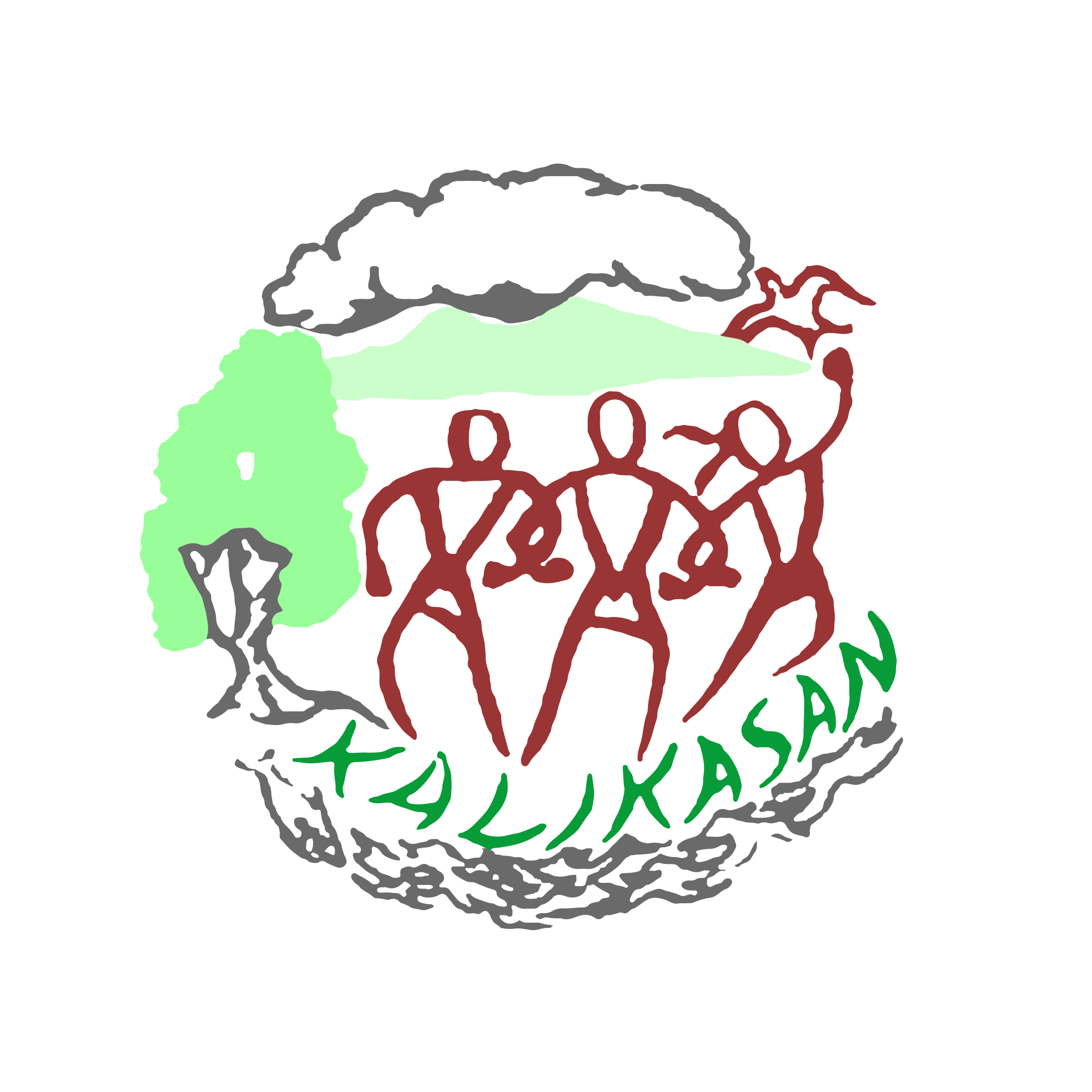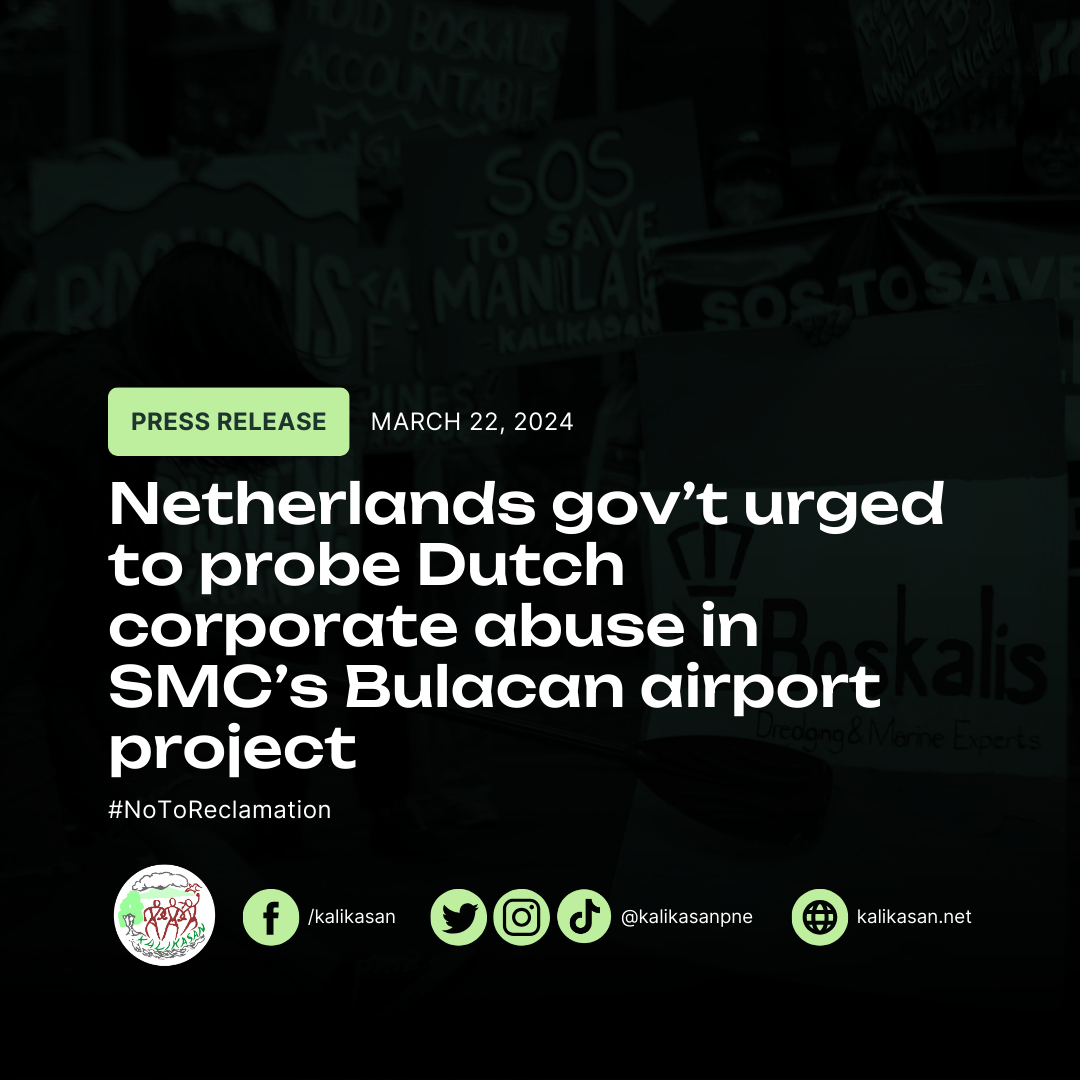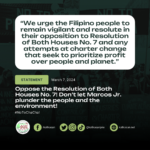Kalikasan People’s Network for the Environment
Press Release
22 March 2024
Netherlands gov’t urged to probe Dutch corporate abuse in SMC’s Bulacan airport project
A parallel protest is happening today in Papendrecht, Netherlands, where Boskalis WMV is headquartered. This is the first of a series of globally coordinated actions against reclamation.
United under the banner Defend Manila Bay, environmental groups and science advocates joined representatives of Cavite, Bulacan, and Metro Manila coastal and fishing communities to demand accountability from the Netherlands government for Dutch company involvement in the San Miguel Corporation’s P735-billion New Manila International Airport (NMIA) in Bulacan, a project they tag as an environmentally destructive reclamation project that gained approval through intimidation of communities.
To bring their calls closer to the Dutch authorities, the group held a lightning rally today, March 22, 2024, in front of the Netherlands embassy in Makati’s Central Business District.
“Dutch company Boskalis Westminster NV stands to profit from the Philippines mega-airport, even as it is devastating the lives of our local fishing and coastal communities and our marine and coastal environment as well,” said Jonila Castro, Kalikasan People’s Network for the Environment’s Advocacy Officer for Reclamation and Water.
In 2018, Boskalis, the Dutch dredging giant, signed a €1.5 billion contract to construct the first phase of the NMIA, a project that is about the size of Makati City itself. The Dutch dredging and heavy-lift company is also currently extracting materials from the coastlines of Cavite province for backfill material for the land reclamation process required to build the mega airport in Bulacan.
“Boskalis is profiting from a project that bypassed environmental and social scrutiny, ignored warnings from impact assessments, and, worst, used military intimidation to coerce ‘consent’ from affected communities. If this is not grave corporate abuse, then what is?” asked community organizer Jhed Tamano, speaking up for fishing communities in Bulacan.
“Soldiers had arrived every day, intimidating the community in Taliptip, Bulacan, threatening the residents that something bad might happen to them if they continued to refuse to leave. They did this until most of the 700 families in the coastal communities there were forced to leave their homes and agree to unjust compensation offers,” Tamano recounted.
Last September, activists Castro and Tamano were themselves abducted by soldiers and held in secret custody for 17 days. When they were abducted, they were conducting a community investigation on reclamation projects and preparing for relief operations and barangay forums in Bataan. They also reported experiencing intimidation and harassment before being taken. They were released a few hours after they bravely disclosed their abduction at a press conference organized by the National Task Force to End Local Communist Armed Conflict (NTF-ELCAC), defying prompts to falsely claim they had “voluntarily surrendered.” Last month, the Supreme Court granted them legal protection with Writs of Amparo and Habeas Data, but the two women still face separate harassment cases filed by the Philippine Army battalion commander responsible for their abduction.
“Jhed and Jonila’s abduction by soldiers is a becoming chilling norm under Marcos Jr.’s reign, emblematic of the militarization targeting communities opposing environmental devastation,” said Lia Torres, one of the leaders of the Environmental Defenders Congress and convenor of the Asia Pacific Network of Environment Defenders. “Under the Marcos Jr. administration, 21 abduction incidents involving state forces targeting 38 individuals occurred, with 14 cases involving defenders. Twenty-one remain missing,” she said.
In February 2023, an investigative report by London-based Global Witness revealed that residents of Taliptip, Bulacan, disclosed that SMC sought approval for an unspecified “land development” rather than the massive airport project.
“This blatant lack of transparency robbed communities of their right to assess the project’s impacts and challenge any resulting harms,” Kalikasan’s Castro decried.
In addition to the displacement of communities from Bulacan, communities across the Manila Bay in Cavite province have also reported losses, prompting their members to join the rally. They emphasize Boskalis’ dredging operations as the cause of their dwindling fish catch, posing a dire threat of hunger to their families.
Hold Dutch export credit agency Atradius DSB accountable
The protesters are also demanding accountability from the Dutch export credit agency Atradius Dutch State Business, which provided at least 1.5 billion euros in export credit insurance to Boskalis for the controversial airport project. Boskalis obtained insurance for the project from the Dutch state through Atradius DSB in May 2022.
“Despite opposition from local communities and civil society groups in both the Netherlands and the Philippines, the application was approved in 2022 by Atradius DSB and Dutch state secretary for finance Marnix van Rij. This contradicts the Netherlands’ government’s own environmental and corporate social responsibility (CSR) goals,” Castro said.
The New Manila Airport project has also sparked significant controversy for its destruction of vital wetlands hosting diverse wildlife, including endangered migratory birds. “Manila Bay is an internationally recognized biodiversity hotspot, and the airport development is set to destroy protected ecosystems in the area,” Jerwin Baure, resident marine scientist of Advocates of Science and Technology for the People, a Defend Manila Bay member organization.
The construction also encroaches upon a recommended ‘strict protection zone’ identified by a joint study of the Philippine and Dutch states.
“The construction will cause irreversible harm to the natural habitats in the area,” Baure said. “As Manila Bay is a productive fishing ground, many fishers will lose their livelihoods. With mangroves being cut down, we also lose their ecosystem function of sequestering carbon from the atmosphere, helping to mitigate climate change.
“It’s puzzling that Dutch companies are involved in this harmful reclamation project, given their collaboration with Philippine authorities on the Manila Bay Sustainable Development Master Plan (MBSDMP) from 2018 to 2020, which received hundreds of millions of pesos worth of funding from the Dutch government.
“We urge the Netherlands government to investigate corporate abuses by Dutch companies and — until these abuses are thoroughly investigated — to pressure the Philippine government to halt the airport project,” Castro said. ###
Contact:
John Carlo Magallon / Communications Officer, Kalikasan PNE
[email protected] / 0955 299 5309



